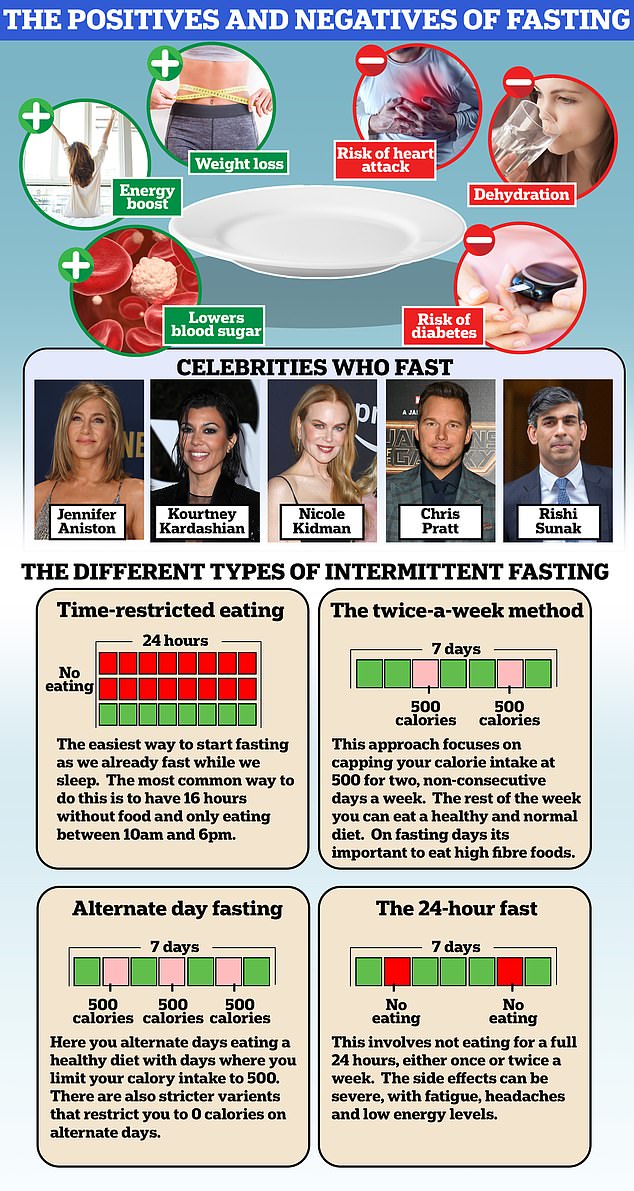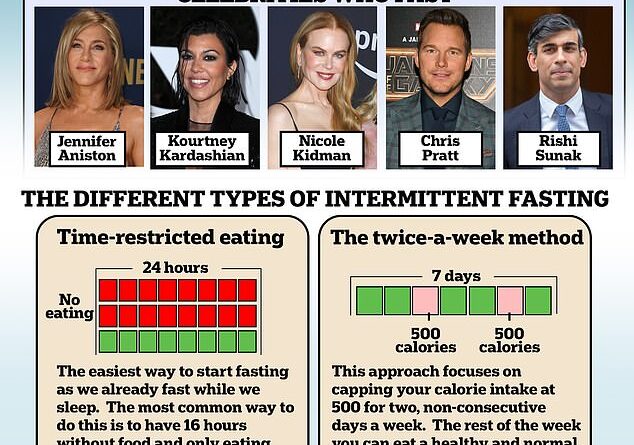Scientists have identified a ‘golden rule’ for making intermittent fasting work
It’s a diet recommended by everyone from Hollywood A-listers to Rishi Sunak, but intermittent fasting doesn’t work for everyone.
Now scientists say they have found a way to strengthen its effects – to focus on what you eat, rather than when you eat.
In particular, a group of US researchers found that the diet only works for weight loss and blood sugar stabilization when people who do it eat fewer calories than they need.
In other words, the number of calories you eat is more important than the time.
Obese people who stuck to a 10-hour eating window from 8am to 6pm, eating most of their calories in the morning, lost 2.3kg (5.1lbs) on average over 12 weeks.

Jennifer Aniston, Chris Pratt and Kourtney Kardashian are some of the Hollywood A-listers who have skipped this trend since it first appeared in early 2010. But, despite many studies suggesting that it works, experts remain divided on its effectiveness and potential long-term health effects.
In comparison, volunteers who ate between 8am and midnight, consuming most of their calories in the evening, lost 2.6kg (5.7lbs).
Both groups of volunteers adhered to a diet recommended by experts with fruits and vegetables, whole grains and lean, low-fat foods.
Nisa Maruthur, a co-author and assistant professor of medicine at Johns Hopkins University, said: “It makes us think that people who benefit from limited eating – which means they lose weight – maybe it’s them eating less calories because their time window is shorter and not something else.’
Jennifer Anniston, Chris Pratt and Kourtney Kardashian are some of the Hollywood writers who broke the fast since it first came to light in the early 2010s.
But, despite many studies suggesting it works, experts remain divided on its effectiveness and potential long-term health effects.
Some argue that people who fast often end up eating too much food at one time, which means they don’t cut their calories – a popular way to hit a plateau.
They are like that warn that it may increase the risk of stroke, heart attack or early death.
The researchers analyzed data from 41 participants, aged 59 and with an average BMI of 36.
At the start of the study, the researchers assessed the participants’ history and activity level to estimate baseline calorie needs.
The participants received a prepared meal with the same macronutrient and micronutrient composition.
They ate the same number of calories every day throughout the study.
During the eating windows, the experiment did not reduce the consumption of alcoholic beverages if they were calorie- and caffeine-free.
Participants were also allowed one cup each of coffee, soda and alcohol per day. Outside of the designated times, only water was allowed.
After 12 weeks, the scientists also found that there were no real differences in fasting glucose, waist circumference, blood pressure or lipid levels.
Writing in the journal Annals of Internal Medicine, the researchers said: ‘Timed eating did not reduce body weight or improve glucose homeostasis compared to a normal diet.
‘This suggests that any effects of time-limited eating on weight gain in early studies may be due to reduced caloric intake.’
#Scientists #identified #golden #rule #making #intermittent #fasting #work
